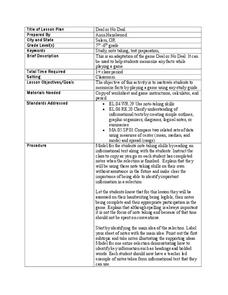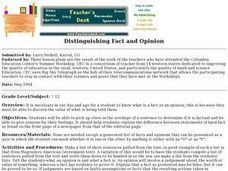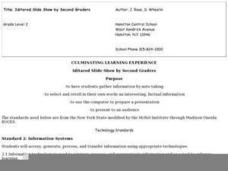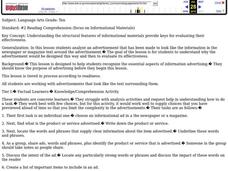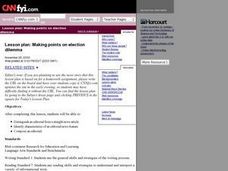Curated OER
Variations of Pain
High schoolers listen to the song :King of Pain" by the Police. They identify different instrumentation and different rhythmic accompaniments to the opening vocal phrase and explore the text in-depth, discussing the various poetic...
Curated OER
Taha Moana - The Sea
Students discuss language, meanings and ideas in a range of texts related to the sea. They write instructions, explanations, arguments and factual accounts, express personal viewpoints on topics related to the sea.
Curated OER
Deal or No Deal
Young scholars play a game in order to memorize any set of facts. In this memorization lesson, students play an adaptation of the game Deal or No Deal to help them review and memorize factual information. Young scholars also work on math...
Curated OER
The Buzz about Fact and Opinion
Students distinguish facts from opinions. In this biological science lesson, students research information on bees to decipher what things are proven true versus assumed. They view a video and discuss what makes the information...
Curated OER
Fact or Opinion-Manatees
Students decipher factual information about manatees. In this biological science lesson, students research characteristics about manatees. They use that information to separate facts from common opinions about the animals. Students...
Curated OER
Evaluating the Validity of Information-Did the Chinese Discover America in 1421?
Students examine the discovery of the Americas. For this US History lesson, students investigate the theory that Chinese explorers initially discovered America. They collect research from a variety of sources, and distinguish between...
Curated OER
Lesson 1: Identifying Information
Factual books about animals are great for sparking interest in non-fiction text. Little ones will love learning about the foods animals eat as they practice identifying facts in a text. They chart the information they've learned by...
Curated OER
Fact or Fiction
Learners explore journalism by reading a book in class. In this factual research lesson, students read a portion of a Magic School Bus book and identify parts that seem to be factual and fictional. Learners view an episode of the Magic...
Curated OER
Distinguishing Fact and Opinion
Students pick up clues in the wordage of a sentence to determine if it is factual and give reasons for their feelings. They explain difference between statements of hard fact as found on the front page of a newspaper from that of an...
Curated OER
Iditarod Slide Show
Second graders read The True Story of Balto, research Alaskan Iditarod, select factual information, and prepare presentation on the computer to present to their classmates.
Curated OER
Mr.Bubble's News
Second graders use a double bubble thinking map to compare newspapers and magazines. They browse through magazines and newspapers to identify characteristics of each type of text and find 5 features for each type of text. They share...
Curated OER
Report Writing in Primary Grades
Students listen and restate facts from a text. They gather and organize information as a class. They create a report and present it to their classmates.
Curated OER
Shrek
Students watch the movie Shrek and compose a text that displays an understanding of the film. Also, they create writing that reflects a critical analysis of content and a personal interpretation of the film's meaning.
Curated OER
Reading Comprehension
Eleventh graders analyze an advertisement. In this advertisement analysis lesson, 11th graders work in learning tiers to complete an analysis of the structure of the advertisement when compared to other text. Students complete a...
Curated OER
Texas History
Students explore the history of Texas. Through researching factual books and folktales, students share their information about Texas. They discuss the Trail of Tears, Davy Crockett, the flags of Texas, and Sam Houston. Students write a...
Curated OER
Eleanor Everywhere
Third graders read a biography on Eleanor Roosevelt. Using the text, they identify and discuss what she did to make a difference in the world. They discover what one person can do to help change the world.
Curated OER
Early Explorers
Fifth graders research European explorers. In this world history lesson, 5th graders will compare eight European explorers and identify important factual information about each. Students will be engaged through game-play and...
New York City Department of Education
Colonial America and The American Revolution
How did the founding of the American colonies lead to a revolution? Use the essential question and sample activities to guide learners through a series of history lessons. Additionally, the packet includes effective strategies to...
Curated OER
Comprehension-Note Taking Skills to Supprt Opinions and Panel Discussion
Fifth graders examine note taking skills in order to support opinions. In this language arts instructional activity, 5th graders read several newpaper articles and discuss a current issue. Students explore how to paraphrase so as not to...
Curated OER
Lesson 3: Encyclopedias
After being introduced to non-fiction texts, second graders meet a different type of non-fiction text that can help them locate factual information. They discuss and examine all of the features found in typical encyclopedias such as,...
Curated OER
Making Points on Election Dilemma
Students define a straight news article, and identify characteristics of an editorial news feature. They read a CNN article that examines the 2000 presidential election, and determine what is factual and what is opinion.
Curated OER
The Chemistry of Water / Industrial Waste at My High School
Students gain factual knowledge of the nature of industrial waste at on their school site. They gain process knowledge of the laboratory techniques and collection procedures for wastewater samples.
Curated OER
Creating a multimedia showcase
Young scholars create a multimedia project using PowerPoint. They retell factual information and create a report using PowerPoint. Afterward, they invite parents and other classes in for a PowerPoint theater.
Curated OER
Report Writing in Primary Grades
Learners learn how to read a short section and parepare a sentence to share with the group. Students listen to the reading of expository text, restate, in sentence format, one fact learned from that text, and produce a report.




